Practicing Social Skills During Family Game Night
Family game night is the perfect opportunity to practice social skills in a supportive environment while having fun!
How to use this resource
This resource is broken into skills that are needed for effective social skills like conflict resolution, communication, and perspective taking. You’ll find suggestions for games that use these skills, as well as strategies for strengthening skill development.
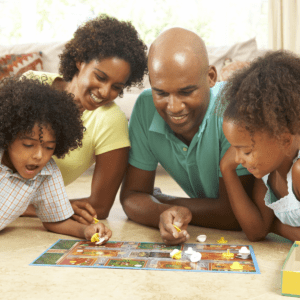
Building Communication Skills
You and your child can practice communication during game play by working together, talking through moves, and using body language and other context clues to guess your opponent’s next move. Conflict that arises during game play is another great opportunity to practice respectful communication: communication that is both clear and respectful.
Strategies:
- Set the stage for practicing effective communication by establishing guidelines on what positive communication looks like during games. You may consider the following guidelines for play:
- No name calling or insulting other players
- Encourage each other during challenging times with phrases like, “You got this!”
- Celebrate success with phrases like, “Great work!” or “You did a great job with __!” or “That was a smart move!”
- Think about how everyone can provide constructive feedback to one another. You may choose the sandwich method, which starts with a positive observation, then constructive feedback, and ends with positive reinforcement.
- Explain the importance of communication in the context of your game, and how it contributes to the game’s success.
- Model active listening as you play through eye contact, avoiding interrupting, minimizing distractions, summarizing, and asking clarifying questions.
Suggested Games:
Games that practice communication are those that require clear and effective communication, active listening, and paying attention to body language such as:
- Charades
- 20 Questions
- Chain Link Story or Group Storytelling
- Telephone
Building Empathy and Perspective Taking
Perspective taking and empathy help us to put ourselves in the shoes of others. This is an important part of social skill building because it helps you understand the other person’s intentions, needs, and motivations. It can also help us recognize the impact of our own actions. Playing games together is a great opportunity for considering others’ viewpoints, and it can make us more successful players!
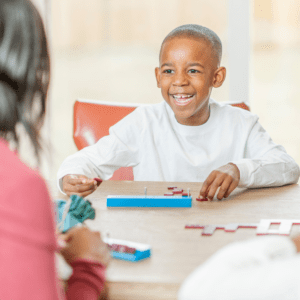
Strategies:
- Allow everyone the opportunity to share their ideas, or what they think your team should do next.
- In games that require strategizing, pause often for discussion and reflection. Some examples of questions to prompt conversation might include:
- “What do you think is the problem?”
- “How might the character be feeling about this problem?”
- “Did anyone interpret this differently?”
- “What do you think we should do next? What consequences do you think that would have?”
Suggested Games:
Games that help practice empathy and perspective taking will be those that require players to understand and connect with others’ emotions, motivations, and experiences. These might include:
- What Would You Do?
- Role playing games
- Narrative video games
Building Trust and Practicing Setting Boundaries
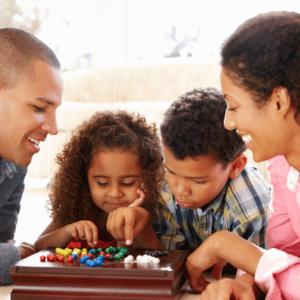
Trust and boundaries help us to feel safer and more comfortable expressing how we feel and engaging in constructive discussion. It can also help prevent conflict from escalating. Games are a great way to practice establishing clear guidelines that all players agree to respect. Learning to trust one another will lead to safer, more successful, more joyful play.
Strategies:
- Review the game rules together and make clarifications or modifications as needed. Check that everyone understands the rules.
- Discuss and agree to expectations around fair play and good sportsmanship. Examples of good sportsmanship might include following all rules, encouraging other players, practicing humility following a win, and being a “good” loser by accepting the loss, congratulating the winner, and not blaming someone else for the loss.
- Ask your child what their boundaries are when it comes to competitiveness, language, and behaviors while playing.
- Establish consequences to cheating, rule breaking, or poor sportsmanship and hold everyone accountable. This could be a warning, skipping a turn, or being removed from the game.
Suggested Games:
Games that build trust and establish boundaries will be those that help everyone get to know each other more deeply, require collaboration and partnership, and have clear rules such as:
- Trust walk or trust fall
- Two truths and a Lie
- Blindfolded games: blindfolded maze walk, pin the tail on the donkey
Building Self-Regulation
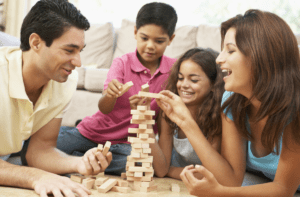
Self-regulation has to do with the way that a person responds to the world around them. Practicing self-regulation skills helps us have appropriately-sized reactions to situations and feelings, like excitement or anxiety about a game or handling a loss.
Strategies:
- Remind your child of your established good sportsmanship behaviors.
- Offer support when you see someone becoming frustrated.
- Take breaks to ease tension and come back to the game when everyone is feeling ready.
- Model positive self-talk such as “Whoops! Maybe I’ll have better luck next time.”
- Lead your child in deep breathing exercises during setbacks or mistakes.
Suggested Games
For games that encourage self-management skills, search for games that involve practicing coping techniques, identifying emotions, or strengthening impulse control.
- Freeze Dance
- Musical Chairs
- Simon Says
- Jenga
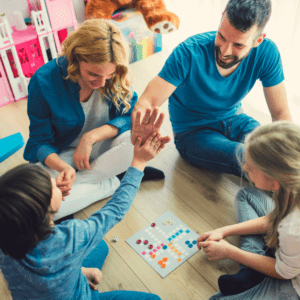
Building Teamwork and Collaboration Skills
Playing games together is a great opportunity to practice compromise, negotiation, creative thinking, and other skills related to working together.
Strategies:
- Help your child to identify other people’s perspectives during a conflict.
- Model the role of mediator. You can do this by maintaining neutrality, helping to summarize what each person has shared, identifying common ground, and assisting in naming options for moving forward. You may also lead players in mindful exercises or call for breaks if tensions are high.
- Decide on roles or responsibilities when applicable. This is also a great way to help your children practice identify their strengths!
- Debrief after the game on what you all think went well and what you could do differently next time.
Suggested Games:
Games that strengthening teamwork will be those that require negotiation, critical thinking, and shared decision-making such as:
- Trivia
- Monopoly
- Escape room-type games
- Legos or puzzles
This project on Improving Mental, Behavioral and Academic Supports to Students and Families, Part 2 is supported by the Centers for Disease Control and Prevention of the U.S. Department of Health and Human Services (HHS) as part of a financial assistance award totaling $434,555 with 100 percent funded by CDC/HHS. The contents are those of the author(s) and do not necessarily represent the official views of, nor an endorsement, by CDC/HHS, or the U.S. Government.